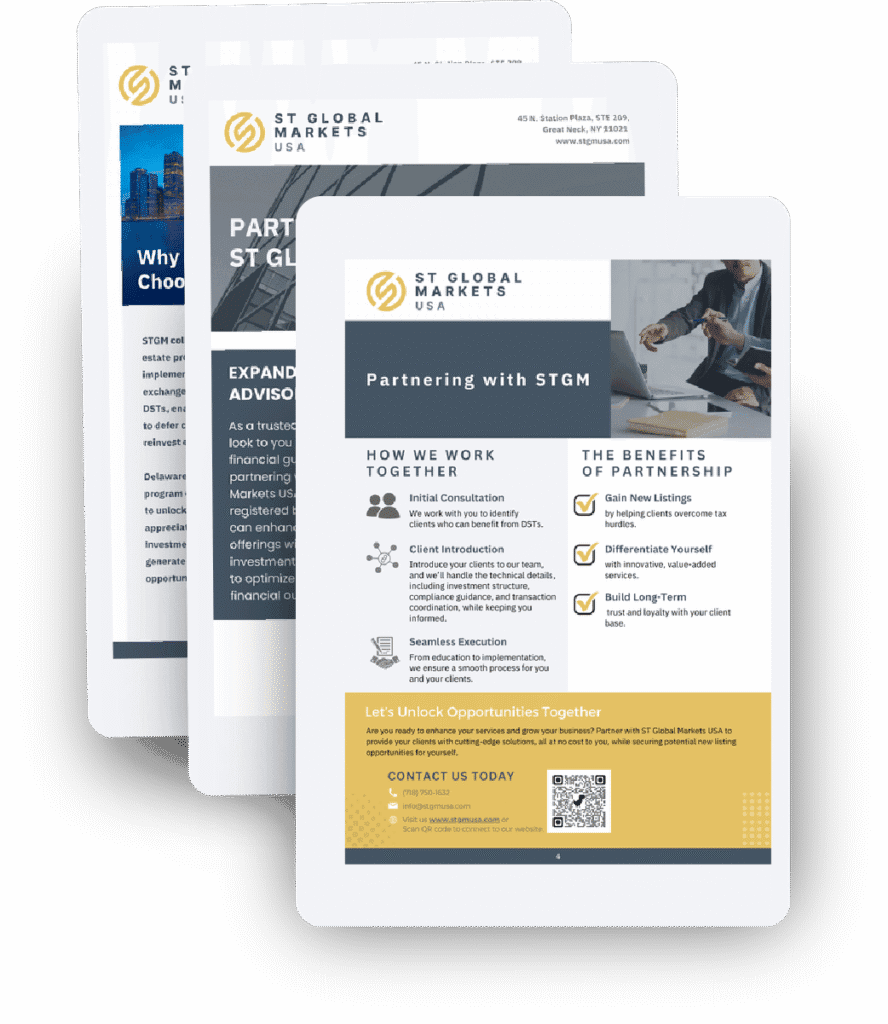The Hidden Strategy Most Real Estate Investors Overlook
For decades, sophisticated investors have leveraged the 1031 exchange as a potential way to defer capital gains taxes and reinvest in new properties. However, many real estate owners, especially those new to tax-efficient investing—remain unaware of this strategy. With tax laws constantly evolving and investors seeking ways to optimize returns while managing tax liabilities, understanding the potential benefits and requirements of 1031 exchanges has never been more critical.
A 1031 exchange, named after Section 1031 of the Internal Revenue Code, may allow an investor to sell a property and reinvest the proceeds into another “like-kind” property, potentially deferring capital gains taxes if all IRS requirements are met. This approach allows investors to fully utilize their sale proceeds with minimal effect on their buying power, potentially compounding wealth over time.
Learn about the rules and flexibility of like-kind properties. Read More
Why Many Investors Overlook 1031 Exchanges
(and How to Fix It)
Despite its potential benefits, many investors fail to utilize 1031 exchanges simply because they don’t know about them or assume the process is too complex. Others mistakenly believe that only large commercial property owners can take advantage of this tax-deferral strategy. In reality, any real estate investor holding investment properties may be eligible—including owners of single-family rentals, multifamily properties, and commercial buildings.
Another common misconception is that 1031 exchanges are too restrictive. While the IRS imposes specific requirements—such as the 45-day identification period and 180-day exchange completion window—these rules still allow for strategic reinvestment in a broad range of properties, including multifamily units, commercial buildings, and even Delaware Statutory Trusts (DSTs) for passive income seekers.

Scaling a Real Estate Portfolio with 1031 Exchanges
Experienced investors and high-net-worth individuals have historically used 1031 exchanges to scale their real estate portfolios while managing tax exposure. By exchanging smaller properties for larger, higher-yielding assets, investors may be able to expand their holdings without an immediate tax obligation.
For instance, a landlord who owns a small apartment complex may decide to sell and exchange it for a larger multifamily property or an industrial asset, potentially deferring taxes while increasing rental income and appreciation potential. Alternatively, investors looking to transition away from active management can exchange into DSTs, maintaining potential tax benefits while shifting to a fully passive investment structure.
Key Considerations Before Engaging in a 1031 Exchange
Before initiating a 1031 exchange, investors should consider the following:
- Strict IRS Timelines: Investors have 45 days to identify a replacement property and 180 days to complete the exchange.
- Like-Kind Requirement: The new property must be of equal or greater value and used for investment or business purposes.
- Qualified Intermediary (QI): Investors cannot take possession of the sale proceeds—funds must be held by a Qualified Intermediary.
- Potential Tax Liabilities: If the new property is of lower value, the difference (known as “boot”) may be subject to taxation.
Get Your Free 1031 Exchange eBook
Access valuable insights and strategies to elevate your investment approach. Get instant access to valuable knowledge to start planning your next move.
Simply provide your information below to download.

Next: Learn about the 1031 exchange process and how investors keep their money moving without triggering taxes. Read More
Frequently Asked Questions (FAQs)
Q1. Can I exchange my rental property for commercial real estate?
Answer: Yes! The IRS allows exchanges between different types of investment properties as long as they are like-kind.
Q2. What happens if I don’t complete the exchange within 180 days?
Answer: If you miss the deadline, your sale will be considered taxable, and you will owe capital gains taxes on the proceeds.
Q3. Can I take cash out of a 1031 exchange?
Answer: If you receive cash or any portion of the sale proceeds (known as “boot”), that amount is subject to capital gains tax.
Risk Disclosure
1031 exchanges involve strict IRS regulations, specific timelines, and potential tax liabilities if requirements are not met. Prior to investing, you should consult with qualified tax, legal, and financial professionals to determine eligibility and understand the implications of engaging in a 1031 exchange.
